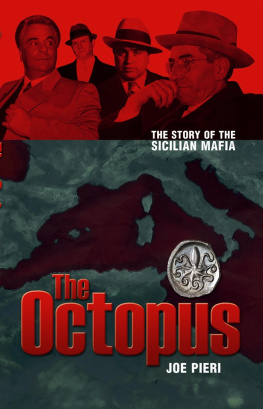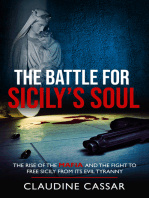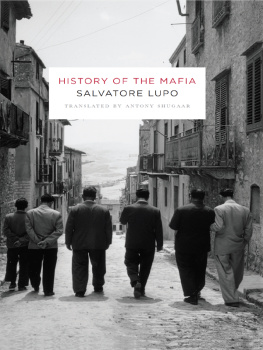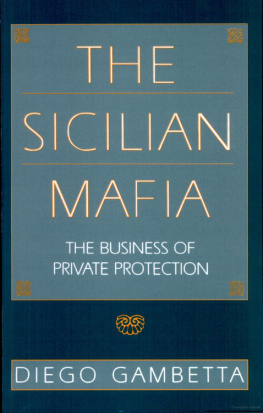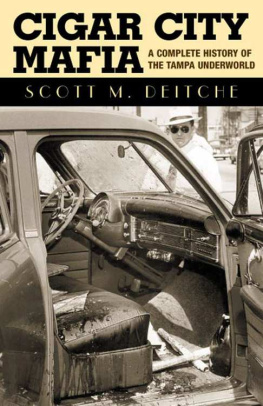THE OCTOPUS
JOE PIERI was born in Tuscany in 1919 but spent nearly all his life as a caf proprietor in Glasgow. He wrote most of his books for pleasure during his retirement. His other books include The Scots-Italians, River of Memory, Tales of the Savoy, The Big Men, Isle of the Displaced and (with Archie Morrison) Wheel of Fortune.

First published in 2007 by Mercat Press
Birlinn Ltd, 10 Newington Road, Edinburgh EH9 1QS
www.birlinn.co.uk
Text copyright Joe Pieri 2007
ISBN-13: 978-1-84183-127-5
eBook ISBN: 978-0-85790-244-3
Prologue
Although I was not aware of it at the time, the seeds of my interest in the Sicilian Mafia, La Piovra, the Octopus, as it is sometimes named in Italy, were sown many years ago, on the last day of June 1940, to be precise, as I sat on a quay at the port of Liverpool with thousands of other prisoners awaiting embarkation on one of the two prison ships at anchor there, the Arandora Star and the Ettrick.
I met Pasquale Nardo on that day in 1940 as we sat cross-legged on the quay, where we had been squatting for hours together with thousands of other prisoners awaiting embarkation on one of the two prison ships at anchor there. It is no part of this story to describe the series of vicissitudes that had brought us side by side on that pier together with thousands of Germans and Italiansthat story has been told elsewhere. Suffice it to say that we struck up an immediate friendship.
Pasquale was a short, stocky and powerfully built youth in his very early twenties, with short curly dark brown hair and a face that reminded me of a smaller Gilbert Roland, a film star of the day. As we sat and waited, he told me about his capture a few weeks before, a few miles off the coast at Trapani, a fishing port on the west coast of Sicily. On the day of Mussolinis declaration of war he and his three companions were going about their business of catching fish, and as their little fishing smack emerged from a dense fog bank they rammed the side of a British submarine which had just surfaced. Presumably to keep his position secret, the British captain promptly took them on board as prisoners and sank their craft. They were put ashore at Malta, then were transferred to a ship bound for Liverpool, where they were decanted into a group of prisoners destined for an internment camp on the St Lawrence river in Canada. The captain of the submarine must have been a very humane man, for he could just as easily have sunk the four without trace along with their craft.
Pasquale spoke Italian with a thick Sicilian accent, which I, with my Tuscan brand of Italian, at first found difficult to understand. He was amazed at the fact that I could speak both English and Italian. He plied me with questions. Where was I from? Why could I speak English so fluently? I had lived all my life in a place called Scotland? Where was this place? Was it near America? He had an uncle in America, he said. Why was I a prisoner like himself? What kind of work did I do in this place? What were the people there like? These conversations continued for the next 14 days in the cramped hold of the Ettrick, the ship that was taking us to what was to be our home for the next three years, and during those 14 days a bond of friendship was formed between the two of us, the one a Scots-Italian from Glasgow and the other a Sicilian fisherman.
If a divine hand had set out deliberately to create in microcosm the bewildering array of different racial strains, cultures and dialects that made up the Italy of the first half of the twentieth century, it could have done no better than the British government had achieved accidentally in the setting up of internment Camp S on St Helenes Island in Montreal in June 1940, at the time of Mussolinis declaration of war on Britain. Imprisoned there in the old fortress, erected by Champlain in 1611 as a protection against the English and the native Indians, were 402 Italians, 250 of them resident throughout the UK, 148 of them merchant seamen taken from ships docked at British ports and Pasquale with his three fellow fishermen, all of them arrested on the day that Mussolini declared war on Britain and France.
The Italy of Mussolinis time had been a nation for only 50 years, and the economic, cultural and linguistic divisions between the people who inhabited the Italian peninsula and who now called themselves Italians were deep and well-nigh irreconcilable. A factory worker in Turin or Milan was no more akin to a Sicilian peasant than he was to a North African Arab. A Tuscan or a Venetian had nothing in common with a Neapolitan or a Calabrese, and to a Sardinian all of the above were as foreign as a visitor from Russia might have been. These differences presented difficulties to any government trying to form a new nation from the hotchpotch of states which had made up the Italian peninsula before unification in the last quarter of the nineteenth century, and much effort had gone into attempts to create a homogeneous Italian state. Those efforts had not been completely successful even towards the end of the twentieth century, and to this day great differences still remain between the cultures and way of life of the north and the south of Italy.
One of the measures taken by successive governments in an attempt to bring about change was that of deliberately mixing together the populations of the regions at every possible opportunity, so as to make the new Italians more aware of one anothers habits and customs, and to create a homogeneous mix in the whole of the peninsula. Army conscripts from the north were sent to do their military service in Calabria or Sicily, and those from the south would find themselves in Lombardy or Tuscany for the period of their training. The crews of merchant ships too contained a compulsory mix of ethnic groups from all over Italy, and this mix was evident in the make-up of the crews of the ships who found themselves prisoners on St Helenes Island, all of whom had been recruited from the four corners of Italy. These seamen now found themselves sharing a few square yards of prison compound with yet another ethnic group, this time made up of Italians who for years had made their home in different parts of the United Kingdom, and who in speech and habit were more akin to their captors than they were to their fellow prisoners.
A few months into the life of the camp, Pasquale decided to put his full trust in me. Mail had begun to arrive for the prisoners through the good offices of the International Red Cross, and the little Sicilian had received a letter from his father in Trapani, written on the old mans behalf by the local priest, for his father could not read or write. Pasquale too was illiterate, in common with 50% of southern Italians, that being the incidence of illiteracy in that part of Italy in those days. Who could he get to read the letter to him? The other illiterate sailors from the merchant ships, and they were many, as a matter of course went to their officers to have their mail from home read out, but Pasquale had no faith in these officers. Most were northerners, and all were Fascisti. He had a deep hatred of the Fascisti, he told me. Too many of his friends had been arrested by them and sent to prison or into exile on the Lipari Islands of fearsome repute. So he approached me and asked me to read his letter, and sat attentively as he listened to the words of his father as set down by the village priest and read to him by his new friend from Scotland. I wrote an answer as Pasquale dictated, and was deeply touched by the simple words of love and affection from a son to his father. To read and write a mans intimate mail with a parent is to see into that mans soul, and so I, as a mark of my appreciation of the trust that Pasquale had put in me, would occasionally read out parts of my own intimate family letters to my new Sicilian friend.

